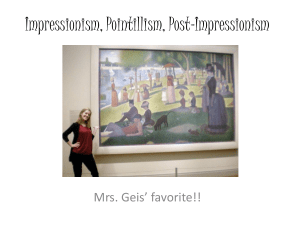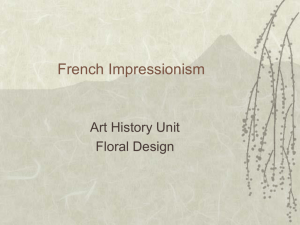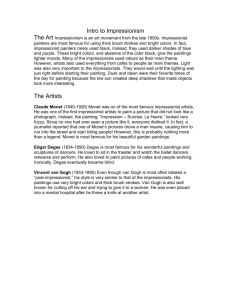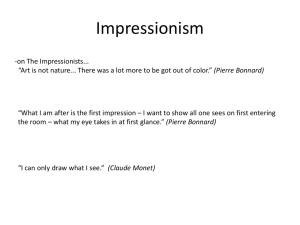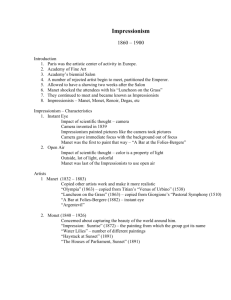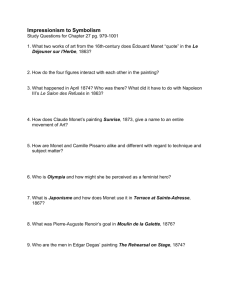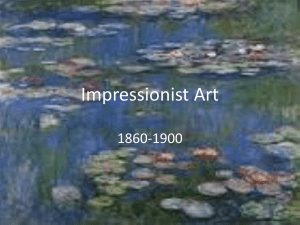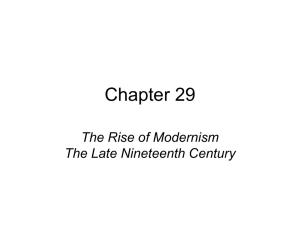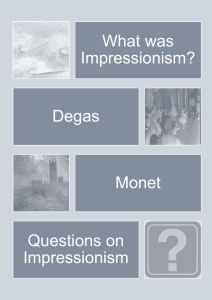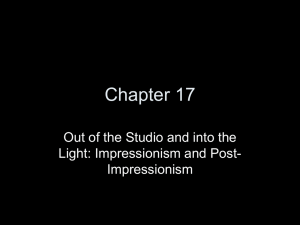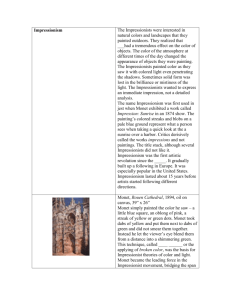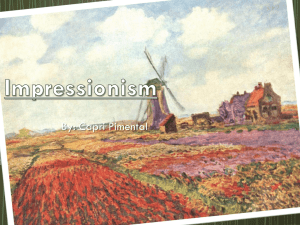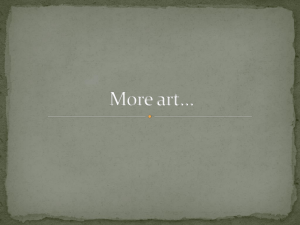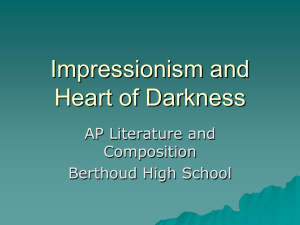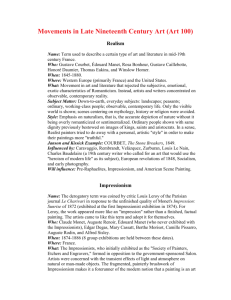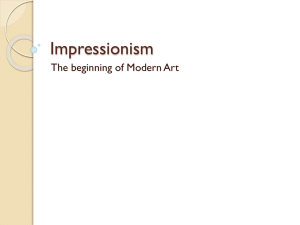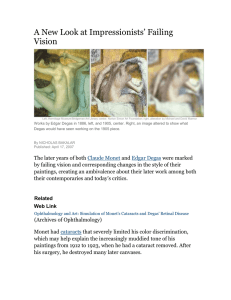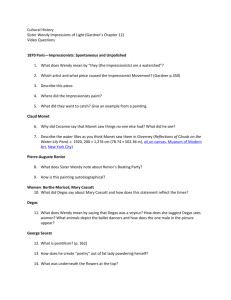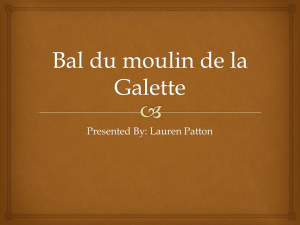Impressionism Presentation
advertisement
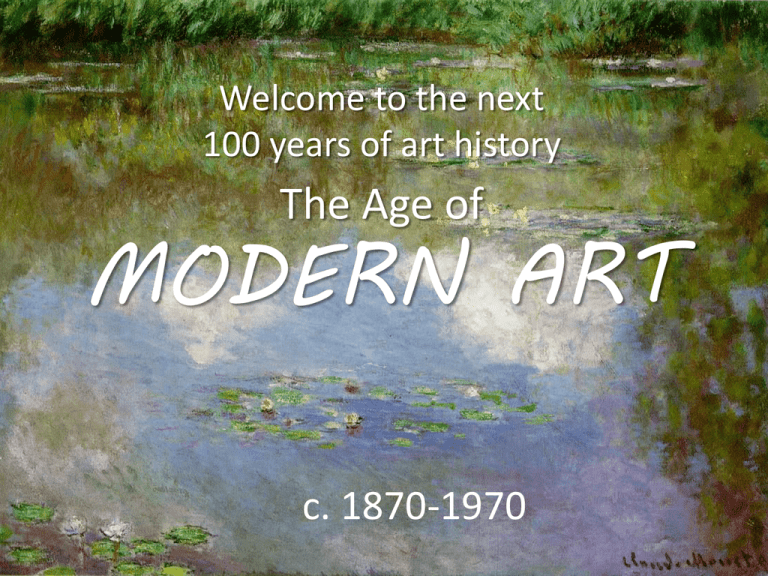
Welcome to the next 100 years of art history The Age of MODERN ART c. 1870-1970 Don’t confuse the word “modern” in Modern Art with the definition of modern, meaning up-to-date or Contemporary Art….that comes in the 100 years after Modern Art. What is Modern Art? There is no precise definition of the term "Modern Art", although it usually refers to works produced during the approximate period 18701970. Typically, modern artists rejected previous Renaissance-based traditions, in favor of new forms of artistic experimentation. They used new materials, new techniques of painting, and developed new theories about how art should reflect the perceived world, and what their functions as artists should be. In addition, entirely new types of art were developed during the period. When did the Modern Art Movement begin? According to most art critics, Modernism in painting first started with the Frenchman, Jean Claude Monet, and the French Impressionists, for its rejection of traditional academic art forms of the 18th and early 19th century. ARTISTS WERE READY FOR A CHANGE! A BIG CHANGE…. Modern Art - the rejection of traditional academic art forms Modern Art saw a shift from the traditional art forms to : - different use of media, like photography, collage, assemblage - Different use of space in architecture – the high rise building (sky scrapers) - Significant rise in Abstract and Non-Representational Art - Social and political transformation/ non-conformity - Artists were eager for change We will start with the Impressionism Art Movement followed by Expressionism Abstract Expressionism Cubism Surrealism Pop Art Minimalism Color Field Impressionism (aka. Impressionist ArtMovement) The beginnings…In the middle of the 19th century—a time of change… Historical subjects, religious themes, and portraits were valued (landscape and still life were not), and the Académie (art jury) preferred carefully finished images that looked realistic when examined closely. Color continued to be somber and conservative, and traces of brush strokes were suppressed, concealing the artist's personality, emotions, and working techniques. Then….a group of young rebellious painters interested in painting landscapes and still life. Experimented with a lighter and brighter manner – both in color and technique. These ‘kids’ are known as the…. The Impressionists Manet Monet Renoir Degas Cassat Impressionism Check out this video •Everyday - subjects and events •Lighting - Captures effects of natural light . Color in artwork is illuminated…or seems to glow •Brushstrokes - Artists have broken the solid shape into smaller pieces and blurred the edges, creating dabs of color that blend together. •Outdoor – en plein air was a common setting •Weather – weather and atmosphere were ‘captured’ (remember ELBOW) Claude Monet b. 1840 – d. 1926 - He wasn’t the first to paint this way, but the first to be “accepted” and called an Impressionist - Main subjects were nature and landscapes- en plein air - Painted same scenes day after day to capture changing of light weather, atmosphere and the changing of seasons Check out this video Woman in a Garden, 1867, Hermitage, St. Petersburg; This was a study by Monet to show the effect of sunlight and shadow on color Impression, Sunrise (Impression, soleil levant), 1872; the painting that gave its name to the style, IMPRESSIONISM Studies - Rouen Cathedrals, 1890’s 1919, Le Bassin aux Nymphéas Worth $82.2 Million Claude Monet, Le Palais Contarini (1908) $165-Million in 2013 Pierre-Auguste Renoir b. 1841– d. 1919 In characteristic Impressionist style, Renoir suggested the details of a scene through freely brushed touches of color, so that his figures softly fuse with one another and their surroundings. • vibrant light • saturated color • most often focused on people in intimate and candid compositions. • Females were his primary subjects. • Later in life he went back to more traditional style of painting *Suffered from arthritis badly - he continued to paint with brushes tied to his wrists. 1876, Le Moulin de la Galette, oil on canvas Sold $71.1 MILLION in 1990 Edouard Manet b. 1832 - d. 1883 He was one of the first 19th-century artists to paint modern life, and a pivotal figure in the transition from Realism to Impressionism …he was a classical artist, but then ‘adopted’ the notions of impressionism. ..he became friends with other Impressionist artists and they influenced each other. Most well known for his social scenes. His self-portrait sold for over $22 million dollars in 2010 The Cafe Concert, 1878 (early) Manet, Le Chemin de Fer (The Railroad) 1872-73 Manet, Le Bar aux Folies-Bergère 1881-82 Edgar Degas b. 1834 – d. 1917 Early work Edgar Degas - Self-Portrait in a Green Jacket, 1856. Oil on canvas • • • • • • cropped subjects awkwardly Showed emotional tension chose unusual viewpoints. Linked to his fascination with photography. He captured ‘snapshots’ Painted ballerinas because they sold well! Sold for $27.9 million in 1999 Edgar Degas, Dance Class at the Opéra 1872 Dance Class at the Opéra Degas Ballerinas to Music Singer with a Glove, 1878 Mary Cassatt b.1844 – d.1926 American Painter, born in Allegheny City, PA Went to Art School in Philadelphia where only 20% of the students were female, none of which were as determined as Mary Cassat, to make painting a career. Moved to Paris and met Degas…who influenced her painting. 1894, Summertime 1880-1881, The Cup of Tea Impressionism - the Big Break in the History of Art Discussion Question: Did you notice I included an ‘adjusted’ price of some paintings in the presentation? The approx net worth means if they were up at auction in the near future, that approximately what they would sell for. How does one put WORTH on a work of art?
